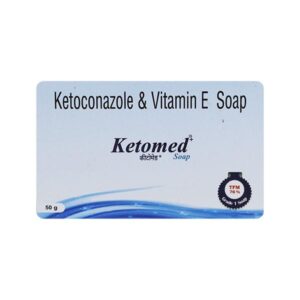KETOCONAZOLE + VITAMIN E ACETATE
Ketoconazole: Ketoconazole is an antifungal medication used to treat various fungal infections. It is available in oral tablet form, as well as in shampoos and creams for topical use.
The mechanism of action of ketoconazole involves inhibiting the synthesis of ergosterol, a crucial component of fungal cell membranes. By disrupting ergosterol production, the drug weakens the fungal cell wall, leading to cell death and consequently eliminating the infection.
The dosage of ketoconazole varies depending on the type and severity of the infection. For systemic fungal infections, the recommended oral dose is typically 200-400 mg once daily. For topical use, the cream or shampoo should be applied to the affected area once or twice daily, as directed by a healthcare professional.
Like any medication, ketoconazole can have side effects. Common side effects include nausea, vomiting, abdominal pain, and headache. It may also cause liver problems, such as elevated liver enzyme levels or even liver damage in rare cases, so periodic liver function tests may be recommended during treatment. Other rare but serious side effects include adrenal gland problems, resulting in hormonal imbalances, and allergic reactions. Patients with pre-existing liver disease or those taking certain medications should exercise caution while using ketoconazole.
It is important to note that ketoconazole has some drug interactions, so it is essential to inform your healthcare provider about any medications you are currently taking to avoid unwanted complications.
Overall, ketoconazole is an effective antifungal medication that is widely used for the treatment of fungal infections. However, it is crucial to use it under the supervision of a healthcare professional, closely follow the prescribed dosage, and report any concerning side effects.
Vitamin E Acetate: Vitamin E acetate is a synthetic form of Vitamin E, which is a fat-soluble vitamin. It is commonly used as a dietary supplement and can also be found in various skincare products.
The main function of Vitamin E acetate is its potent antioxidant activity. Antioxidants help protect cells from damage caused by free radicals, which are unstable molecules that can cause oxidative stress. By neutralizing these free radicals, Vitamin E acetate helps prevent cell damage and supports overall cellular health.
In terms of dosage, the recommended daily allowance (RDA) for adult men and women is around 15 mg (22.4 IU) of Vitamin E acetate. However, the dosages may vary based on a person’s age, health condition, and other factors. It is recommended to consult with a healthcare professional to determine the appropriate dosage.
Vitamin E acetate is generally considered safe when taken in recommended doses. However, excessive use of Vitamin E supplements may lead to adverse effects such as nausea, diarrhea, abdominal pain, dizziness, headache, fatigue, and muscle weakness. In rare cases, high doses of Vitamin E can interfere with blood clotting and increase the risk of bleeding. People with vitamin K deficiency, bleeding disorders, or those taking anticoagulant medications should exercise caution while taking Vitamin E supplements.
It’s important to note that Vitamin E acetate should not be used as a substitute for a balanced diet. It should not be used as a primary treatment for any medical condition without consulting a healthcare professional.

